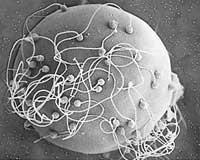Shy sperm cells
Despite their reputation as irreverent, the sperm come close to the ovules at the door. Scientists at the University of Illinois and Emory University have identified the group of proteins that send the sperm signal to pass through the protective membrane of the egg. When the sperm touches the egg, the galactosil sperm transfer binds to the protein ZP3 of the egg membrane.

But this galactosil transferase has two forms: one long and one short (less amino acids). When the protein ZP3 of the egg coincides with the long form of the sperm transfasa, the G proteins present in the egg and sperm release the enzyme vesicles necessary to introduce sperm into the egg.
Conversely, when the ZP3 protein matches the short form of the transfasa, G proteins are not activated. This discovery can be important for studying sterility, improving contraceptive methods, increasing the production of farm animals, and recovering endangered species. However, they should analyze if there is another step between galactosil transferase and ZP3.





